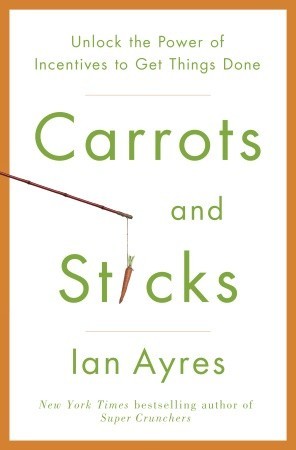Carrots and Sticks Summary

5 min read ⌚
 “Carrots and Sticks” – Have you ever wondered what the reason that so many people give up before reaching their goals is?
“Carrots and Sticks” – Have you ever wondered what the reason that so many people give up before reaching their goals is?
For example, so many people want to lose weight, yet they give in to their cravings. Alternatively, they want to quit smoking but never do.
Are you one of them? We are sure that you have come across a situation like that. So, you may wonder why is that the case, and how you can change it.
Our “Carrots and Sticks” summary leads you to the roots of this behavior and the answers to all of the questions you may ask.
Did we get your attention? Good. Then read on:
Who Should Read “Carrots and Sticks”? and Why?
Are you one of the people that want to turn around their life? Do you make the same resolutions and set the same goals over and over again, and yet, you are still living the life you wanted to change in the first place? Then, this is the book for you!
Ian Ayres shows you how you can craft a “commitment contract” and use the method of “carrots and sticks” to stick to it. We are certain that once you finish the book, you will be one step closer to reaching your long awaited goals.
Before we dive in deeper, let’s learn a few things about our authors:
About Ian Ayres
 Ian Ayres teaches at Yale Law School and the Yale School of Management and is editor of the Journal of Law, Economics, and Organization.
Ian Ayres teaches at Yale Law School and the Yale School of Management and is editor of the Journal of Law, Economics, and Organization.
Ayres has authored the best-selling Super Crunchers and has published for the Wall Street Journal, the New York Times, International Herald Tribune, Financial Times, and The New Republic.
Now that we got you familiar with the authors and the book’s target let’s move to the more-in-depth summary of this book.
“Carrots and Sticks Summary”
The appropriate response lies in human conduct. Most people want to fulfill their needs and wishes immediately. They prefer having a little reward at the moment than sit tight for a bigger reward later.
This state of mind is called “hyperbolic discounting,” which can help clarify why you may settle on an objective and afterward not have the capacity (or drive) needed to achieve it.
As choices and enticements introduce themselves, the resistance you may feel decreases.
Your psyche is sufficiently sophisticated to comprehend that you will lament yielding. However, every other person on the planet inclines toward quick alleviation as opposed to the guarantee of later achievement.
The thing is, you feel terrible when you give in. Even worse, you know that you will feel terrible once you capitulate.
You know you should hold up and deny the urges to cave in since you will feel like a disappointment if you fall under the pressure of the fretful side of your character.
To become stronger and keep your eyes on the prize, consider a “commitment contract.” What is that and how does it connect to “carrots and sticks”?
Read on to find out.
So, what does the term “carrots and sticks” mean? The original word implies a carrot swinging from a stick before a jackass to keep the animal pushing ahead.
In this context, however, we will consider carrots as rewards and sticks as punishments, or in other words, see the term as a code for commitment devices.
This picture assumes a considerable part of duty agreements since incentives can be beneficial.
Incentives can make you more mindful of other people’s sentiments. Furthermore, they can help you make better choices. Additionally, carrots are effective mechanisms for removing the alternative to cheat or back down.
Be that as it may, you must be careful not to wind up defending a cash punishment as a worthy price to pay for yielding to temptations. Your stick must be sufficiently significant to beat your regular slant toward hyperbolic discounting.
Loss aversion is another factor that assumes a part in picking the size of your sticks. People usually wish to keep what they have and loathe losing it.
Studies in the field of psychology show that big sticks motivate individuals to work twice as hard than they would work for an evenly big carrot.
Then again, if a stick is too big, it can stop you from committing to a goal. Studies have shown this can be a problem.
Exceptionally correctional contracts can bring about a sort of mental backlash. Striking a harmony between acceptably big sticks can help you achieve your goals in the short term and abstain from backsliding later.
Additionally, consider a mix of both carrots and sticks in your commitment contract to make the most of it.
Next, we move on to some of the key lessons that we extracted from the book.
Key Lessons from Carrots and Sticks:
1. The Three Questions of a Commitment Contract
2. The Key to Staying Successful
3. Commitments Communicate and Enlighten
The Three Questions of a Commitment Contract
First, consider “To what” you are committing. When doing this be as specific as you can be. Next, ask yourself “To whom” are you committing?
Lastly, determine the consequences and the penalties for failure, and whether you are using sticks, carrots or a combination of both as well.
The Key to Staying Successful
When you make your commitment contract, think past it. You also ought to make a maintenance contract. Pledge to manage your success, regardless of whether it is keeping your weight off or never having another drink.
Set out to determine where you stand, to ask yourself how is your progress going. If your original objective was to get thinner and you achieved it, continue screening your weight each day.
Promise yourself to react instantly if your weight goes up by up to five pounds. Choose whether you will concentrate on the way that you made your underlying objective or whether it is more mentally beneficial to set another one.
Permit yourself some flexibility, yet ensure that any “special cases” you make are “hard-edged.”
Commitments Communicate and Enlighten
You can encounter commitment contracts in unexpected places.
For instance, many companies offer wellness programs to improve their employees’ health habits. The carrot can of such a program can be smaller health insurance fees.
A commitment contract can help you gain valuable insight into your life and behavior, and make you start leading a better life.
Like this summary? We’d Like to invite you to download our free 12 min app, for more amazing summaries and audiobooks.
Our Critical Review
“Carrots and Sticks” is a thoroughly researched book that cites various studies on where the motivation’s roots lie.
The book is entertaining and well written, but if you are looking for a self-help book with specific improvement plans and steps, look someplace else, because this is more of a study on what motivates us as humans.








